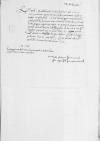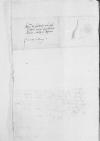Letter #731
Jean CARONDELET to Ioannes DANTISCUSs.l., 1531-12-26
Manuscript sources:
Auxiliary sources:
Prints:
| ||||||||||
Text & apparatus & commentaryPlain textText & commentaryText & apparatus
Reverendissimo in Christo Patri, domino
Reverendissime Domine.
Reddidit mihi hic tuus familiaris litteras Dominationis Tuae ac alias praecedentes, quibus non licuit respondere multo minus satisfacere propter haec praesentia festa. Verum dabo omnem operam in proximo consilio, quod postridie Innocentium spero conveniet, ut tuo desiderio fiat satis. Saltem proponam negotium toti collegio ac promovebo, quam potero maxime, perinde ac si mea aut fratris mei interesset, adeo ut Dominatio Tua Reverendissima cognoscet promptum erga se animum meum et ubi consilium suum calculum ac decretum desuper ediderit. Curabo id impigre indicari Tuae Dominationi {Vestrae} Reverendissimae. Cui me plurimum commendo.
Postridie Nativitatis Christianae anno 1531.
Dominationis Vestrae uti frater
Postscript:
Si contingat consilium citius convenire, quod certe futurum spero, conabor citius rem hanc expediri.


 UUB, H. 154, f. 73v
UUB, H. 154, f. 73v